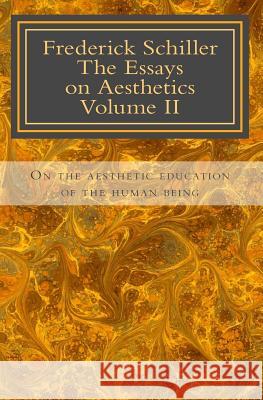Frederick Schiller The essays on Aesthetics Volume II: The essays on Aesthetics » książka
Frederick Schiller The essays on Aesthetics Volume II: The essays on Aesthetics
ISBN-13: 9781470134303 / Angielski / Miękka / 2012 / 226 str.
Part Two: Aesthetics on the national level "On the aesthetic education of the human being" is probably the most famous work of Frederick Schiller. In this masterpiece, he presents in a series of 27 letters the many points that people should know about in order to complete his or her aesthetic education. These letters constitute one of Schiller's most valuable legacy to the past, present and future generations. It links the actions of the individual citizen to the various groups and interests they belong to, and finally, to the clockwork of the national government. In "On the ground for enjoying tragic subjects" and in "On the contemporary German theater," Frederick Schiller analyzes the many aesthetic effects of tragic subjects, among other things, that these subjects reflect to us values we cherish, but which unfortunately, we cannot always observe the prevalence in reality. "On the national scene considered as a moral institution" approaches the national scene (taken in its broader meaning; that is, any media coverage of national scope which has a determined plan) as an educational tool. This essay can also be considered as a governance essay, however, it is not superfluous to have it read by the greater number of people who has to judge about national events almost on a daily basis. "What can a national scene really perform?" was written to reflect on the plan of what people should know about on a national level. It is directly linked to the previous essay (only a few passages of the previous essay were changed), and gives the reader an additional awareness of what the national scene can be about, and the manner how this should be presented to the public. These essays, hence, focus on the need to have a continued national education for all the citizens in order to remind them of what is important, at any precise time, for the largest group that the nation constitutes. A reminder that whatever family, group of interests or philosophical school we belong to, there is only one country and only one nation in which everybody is evolving.
Zawartość książki może nie spełniać oczekiwań – reklamacje nie obejmują treści, która mogła nie być redakcyjnie ani merytorycznie opracowana.











